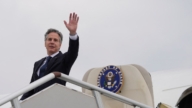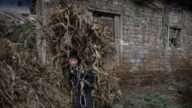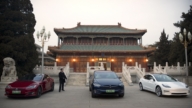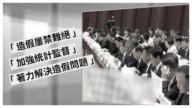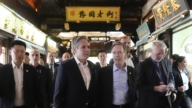【新唐人2013年04月03日讯】前中共总书记胡耀邦之子、全国工商联原党组书记胡德平透露,中共今年可能会展开内部整风活动。他建议,把改革和整党、学习宪法结合,由党中央推进。不过,学者指出,如果中共不触动一党专制进行根本改革,中国可能将发生革命。
香港《明报》4月2号报导,胡德平出席他的新书《改革放言录》座谈会时表示,下一步改革要由中共中央推进,结合整风和整党。他说:“国务院哪个部门、哪个领域的改革都有困难,遇到阻力相当大,就算是做了,也往往会变样,一个部门很难推,国务院来搞也有难度,非得要共产党来搞。”
胡德平还说,改革应该与整党结合,“轻则整风,重则清党,改革中谋私、为利益集团工作的,情节严重的,可以清掉。”
他指出,整党同时也要强调学习宪法,中共要在宪法、法律范围中活动。
胡德平在座谈会上引用了王立军的事例说,王把没罪的“也可以拉出罪来”,没事的“还有刑讯逼供”,甚至主张公安在生命遇威胁时可无论对错击毙他人。深圳最近也有街道规定民警击毙犯罪份子可获奖励,这些做法都是在践踏法治。因此,谈改革更需要针对现实。
现任“中国管理科学院”农业经济技术研究所研究员及副所长的姚监复认为,现在中共连邓小平强调的党政基本分开也没有了,因此政治体制必须改革党:消弱它的特权,取消利益集团的利益。
中国管理科学院研究员姚监复:“改革要自己改自己,要自己割自己肉,也是困难的。所以,现在很可能出现一个政治不改革,经济在改革,讲民生主义,讲民族主义,不讲民权主义,只要能混得过去。”
姚监复指出,中共在执政前就明白了中国社会问题的实质所在,如40年代,重庆《新华日报》、和延安《解放日报》,曾多次刊登中共领导人的表态。
姚监复:“上个世纪40年代,毛提出了改革的方向和原则就是:废除一个党、一个主义、一个领袖的法西斯独裁专制。这个在毛泽东选集第三卷912页就有。 现在要改,就应该落实毛泽东上个世纪40年代说的废除一党专政,如果不是这样做,就不是政治体制改革,只是提高效率的政府机构改革、行政机构改革。”
胡德平新书《改革放言录》,收集了胡德平1984年以来的文章、讲话、访谈和书信,主题包括改革开放、民主法治、民营经济等。
胡德平在前言写道,“放言”意指没有恐惧感的畅所欲言。而他对前重庆市委书记薄熙来“唱红打黑”的看法是,必须“根本否定文革”,不应再用“文革”的方法解决当前矛盾,而是要用民主法制、政治体制改革和宪法。
姚监复指出,中共要改革,首先要按国际规矩办事:一个政党不能用国家财政、和纳税人的钱来养活,党的干部与公务员无关。当然还有官员的退休制度等。
姚监复:“如果自己不改革,不能从上而下的和平改革,就可能积累矛盾到一定的深度,出现爆炸性局面,来自下而上的改革就成了革命。这一点 ,领导有清醒的认识,例如王岐山让大家看托克维尔的《旧制度和大革命》。”
《旧制度与大改革》剖析了腐败和不得人心的专制社会,发生大革命的原因。
《人民日报》也承认,当前中国社会背景复杂和社会矛盾激化的处境,与“法国大革命”时期有某种相似性。
姚监复表示,从目前看,中共还是继续用维稳的策略,而不是用舆论公开、新闻自由来对民众减压。姚监复说,未来出现“旧制度”下的大革命不可避免。
采访/刘惠 编辑/宋风 后制/萧宇
Hu Deping: Cleaning up of the Party May Be Staged
Hu Deping is the son of Hu Yaobang,
former Chinese Communist Party(CCP) leader.
Hu Deping recently remarked on the CCP’s tidying of
the Party, which may be staged in this year.
Hu Deping argued that the CCP shall push for reforms, together
with ideological rectification and study of the Constitution.
Yet, scholars warn if the CCP fails to reform its one-party rule,
China will see a down-top revolution.
On April 2, Hong Kong’s Ming Pao newspaper reported on
Hu Deping’s talks at a forum on his new book.
He said the CCP Central Committee should push
for reforms, combined with an ideological rectification and tidying of the Party.
“Major resistance will make it difficult to carry out
reforms in all state departments and in all fields.
Even if it’s done, the outcome will result in some distortion.
It’s hard for any department or the State Council to
dominate reforms, only the CCP has the capability of doing it.”
According to Hu Deping, reforms should be
accompanied by tidying the image of the Party.
“At best, it’ll be an ideological rectification;
at worst, it’ll be tidying the Party image.
Those who have sought gains for themselves and
for interests groups, in serious cases, can be purged from the Party.”
Hu Deping’s talk also emphasized study of the Constitution.
The CCP should function within the scope of
the Constitution and laws, he said.
At the forum, Hu Deping took Wang Lijun as an example.
He said that Wang labeled innocent people as criminals
and tortured them to extort confessions.
Wang even authorized the police to randomly kill others
when encountering a life-threatening situation.
Recently in Shenzhen, the sub-district offices offered
financial rewards to police officers who could shoot and fatally wound criminals.
Hu Deping said that all these practices
are trampling the rule of law.
He remarked that reforms should be
based on reality.
Yao Jianfu, veteran researcher in the China Academy of
Management Science, comments.
He says, Deng Xiaoping raised the issue of “Party-
government separation”, which has disappeared today.
Therefore, the Party shall reform the Party itself,
to weaken its authority and axe remaining privileged groups.
Yao Jianfu: “To reform itself, is like cutting its own meat,
which is certainly difficult for the Party.
So it’s likely to result in reforms in economy
not in politics.
That is, it will propagate the people’s livelihood and
nationalism, but without advocating democracy.”
Yao Jianfu indicates that the CCP had known clearly about
the essence of China’s social problems before it took power.
In the 1940s, Xinhua Daily and Yan’an Liberation Daily
repeatedly published CCP’s then leaders’ advocacies.
Yao Jianfu: “In the late 1940s, Mao proposed
the direction and principles of the reform.
That is, abolishing the fascist dictatorship of one Party,
one doctrine and one leader.
The Selected Works of Mao Zedong recorded it.
So in today’s reforms, they should put it
into practice by abolishing one-party dictatorship.
If they don’t, that’s not political reform, but restructuring
state departments, just to improve efficiency.”
Hu Deping’s new book “Freely Airing My Views on Reforms”
collects his articles, speeches, interviews and letters since 1984.
It includes topics of reforms & opening up,
democracy & rule of law, private economy, among others.
Hu Deping wrote in the foreword, “freely airing my views”
refers to speaking my mind without fear.
On Bo Xilai’s campaign of fighting the mafia and
singing revolutionary songs,
Hu Deping advocated to
“negate the Cultural Revolution fundamentally”.
He said that democracy, political reform and the Constitution
shall be the ways out to resolve current social conflicts.
Yao Jianfu says that for the CCP’s reform,
the first thing to do is to follow international practice.
A political party cannot live on state funding and taxes.
Yao adds that officials should be separated from civil servants.
That’s also including official’s retirements and so on.
Yao Jianfu: “If it doesn’t stage a top-down peaceful
reform, social conflicts will continue to intensify.
That will lead to the outbreak of a down-top revolution.
Party leaders have actually known it clearly.
Case in point, Wang Qishan asked every cadre to read
‘The Old Regime and the Revolution’, authored by Tocqueville.”
“The Old Regime and the Revolution” analyzes the old regime
in France, which collapsed due to corruption and losing popular support.
The book investigates the causes and forces that
caused the French Revolution.
According to the People’s Daily, today’s China
is mired in complex and intensified social conflicts.
To some extent, it is similar to the period of the
French Revolution, said the newspaper.
Yao Jianfu adds that so far, the CCP still resorts to violence,
instead of press freedom, to stabilize its rule.
He forecasts that a big revolution under “the old regime”
will be inevitable in the future.



